
by Eron Henry | Jul 11, 2025 | News, News
As the sun rises over Philadelphia during the 128th Lott Carey Annual Session from August 11-14, attendees will be greeted each morning by a powerful lineup of preachers whose ministries embody the spirit of mission, justice, and transformation. These morning worship services, held at the Philadelphia Marriott Downtown and hosted by Enon Tabernacle Baptist Church, promise to set a tone of inspiration and spiritual renewal for each day of the gathering.
A trailblazer in ministry and an insistent voice for justice and empowerment, Dr. Gina M. Stewart, Lott Carey’s immediate past president, returns to the Lott Carey pulpit as a morning preacher. As the first African American woman to pastor an established Black Baptist church in Memphis and Shelby County in Tennessee, her leadership at Christ Missionary Baptist Church has been marked by prophetic preaching and transformative community engagement. A scholar, preacher, and advocate, Dr. Stewart continues to inspire with a message rooted in faith, equity, and global mission.
Dr. Ezra Tillman brings a heart for evangelism and a legacy of community transformation to the morning pulpit. Known for his leadership during the Flint Water Crisis, where he partnered to provide clean water, and for co-founding the Revive Community Health Center, Dr. Tillman exemplifies faith in action. At First Baptist Piney Grove, he led the congregation through a successful debt elimination campaign, culminating in a mortgage burning in 2024.
With a unique blend of pastoral care and legal expertise, Dr. Duane Kay offers a voice of wisdom and integrity. As both a pastor and attorney, he leads First Baptist Church of North Brentwood while also managing Kay Legal, LLC, a firm focused on wealth management and estate planning. A graduate of Virginia Union University and Mitchell Hamline School of Law, Dr. Kay was also a participant in Lott Carey’s Pastoral Excellence Program.
Representing the next generation of mission-minded leaders, Rev. Brittany Mingo brings youthful energy and prophetic insight to the morning worship experience. As the IYD Team Leader, she mentors and mobilizes young people across the Lott Carey network. The Associate Pastor of Elevation Community at Enon Tabernacle Baptist Church, her ministry is marked by authenticity, innovation, and a deep love for the church.
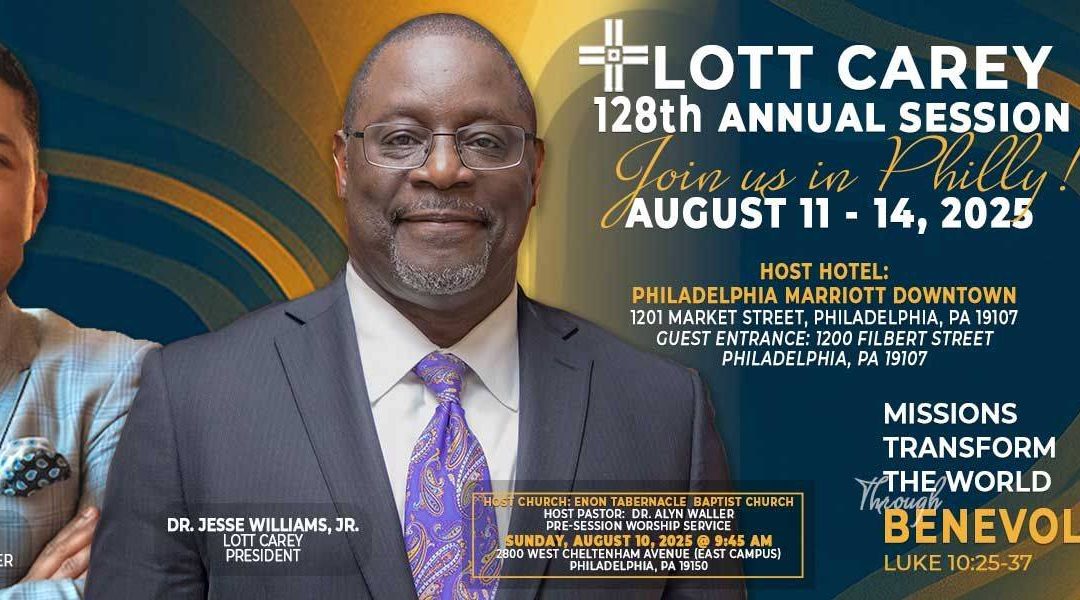
by Eron Henry | Jun 19, 2025 | News, News
Registration is now open for the 128th Lott Carey Annual Session, and we are excited to welcome you to Philadelphia, Pennsylvania, from August 11–14.
An extra day, August 15, is for those who wish to participate in the annual golf tournament.
This year’s gathering marks the beginning of another chapter in our shared mission journey, launching a three-year vision under the theme “Missions Transform the World through Benevolence,” drawn from Luke 10:25–37.
We invite you to join us in exploring the pillars of benevolence, empowerment, and advocacy—anchored in faith and driven by purpose.
This in-person experience will be filled with vibrant worship, transformative witness, and deep engagement. Attendees will participate in morning prayer gatherings, CommUNITY sessions with Women in Service Everywhere (WISE) and SpeakMen (Men on Missions), mission education studies, and hands-on service opportunities. Morning and evening worship will be led by dynamic preachers and gifted psalmists, creating sacred moments of inspiration and renewal. Children and youth will also have dedicated programming, ensuring that every generation is included in this meaningful experience.
Special events will include a Pre-Session Worship Service at Enon Tabernacle Baptist Church, a Worship Arts Concert, an Evening of Jazz, a Golf Tournament supporting international education, and the Missions’ Luncheon featuring voices from our global partners.
The Lott Carey team, alongside our local host partners in Philadelphia, has been working diligently to make this Annual Session a memorable and impactful experience.
We sincerely apologize for the inconvenience caused by the recent technical difficulties with the Lott Carey website. We are pleased to share that those issues have been fully resolved, and one can access the registration system through the Lott Carey website. We appreciate your patience and understanding during this time.
Now is the time to secure your spot and make your hotel reservations. Join us in Philadelphia for this historic moment in the life of the Lott Carey family. Your presence will help shape the future of our mission efforts and set the tone for this exciting new season.
We can’t wait to see you in Philadelphia. Click here to register.

by Eron Henry | May 21, 2025 | News, News
The Lott Carey global mission community is calling on its members and partners to respond with compassion and urgency to the devastating tornadoes that struck St. Louis on May 16. This disaster has left a trail of destruction across neighborhoods, claiming lives, displacing families, and damaging homes, churches, and community centers.
The EF3 tornado that tore through the city caused more than one billion dollars in damage. More than 100,000 residents lost power, and at least five lives were lost in the storm. Entire communities are now facing the long road to recovery, with many in urgent need of shelter, food, medical care, and emotional support. Tornados affected other areas taking the lives of many and causing widespread damage.
In the spirit of our mission to extend Christian witness through acts of service and solidarity, Lott Carey encourages its members to take action. We ask that you lift up the people of St. Louis in your prayers. Pray for comfort for those who are grieving, strength for those who are rebuilding, and wisdom for leaders guiding the recovery.
In addition to prayer, monetary donations are the most effective way to support relief efforts. We urge you to contribute to Lott Carey in its compassionate response.
We also encourage you to spread the word within your networks. Encourage others to support the recovery efforts and to stand in solidarity with our brothers and sisters in St. Louis.
Lott Carey stands with the people of St. Louis. Together, we can be a source of healing in this time of great need.
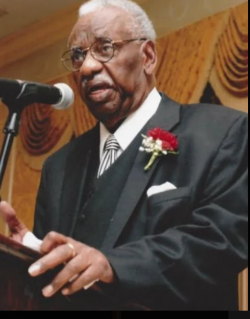
by Eron Henry | May 1, 2025 | News, News
The Lott Carey Baptist Foreign Mission Convention joins the broader faith community in mourning the passing of Rev. Dr. Gus Roman, former President of Lott Carey and a towering figure in the global Church. Dr. Roman transitioned from labor to reward on April 23, leaving behind a rich legacy of leadership, prophetic witness, and global impact.
Rev. Dr. Roman served Lott Carey with distinction, bringing visionary leadership and a passionate commitment to global missions, justice, and pastoral excellence. His contributions to the growth and reach of the Convention were both transformational and enduring. As President from 1997-2000, he helped amplify the voice and work of Lott Carey across Africa, the Caribbean, and other parts of the world.
In celebration of his life and legacy, Lott Carey will be officially represented at his Service of Triumph by:
- Rev. Emmett L. Dunn, Executive Secretary-Treasurer
- Rev. Gregory Jackson, Chairman, Board of Directors
- Rev. Dr. Clifford A. Jones, and Rev. Dr. J. Michael Sanders, former Lott Carey presidents
Alongside an array of other Lott Carey leaders and partners.
“We give thanks to God for the life and service of Dr. Roman,” said Executive Secretary-Treasurer, Rev. Dunn. “His voice called us to a higher standard, and his life modeled servant leadership rooted in justice, compassion, and conviction. He will be deeply missed but never forgotten.”
Service Arrangements:
Public Viewing
Thursday, May 8, 2025
11:00 AM – 7:00 PM
Zion Baptist Church
3600 N. Broad Street
Philadelphia, PA
Celebration of Life Service
Friday, May 9, 2025
Viewing: 9:00 AM – 10:00 AM
Service: Immediately following
Salem Baptist Church of Abington
2741 Woodland Road
Abington, PA
Livestream available via Salem’s website
Interment
Friday, May 9, 2025 – 2:00 PM
George Washington Memorial Park
80 Stenton Avenue
Plymouth Meeting, PA 19462
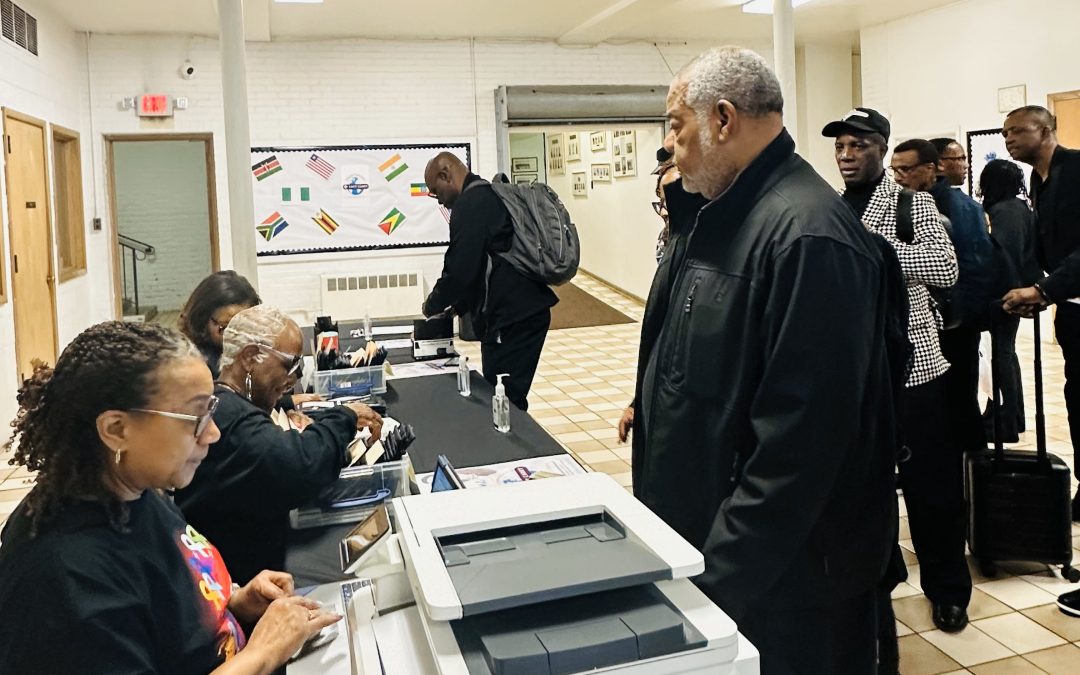
by Eron Henry | Apr 28, 2025 | News, News
Lott Carey is thrilled to announce its 128th Annual Session, scheduled to take place from August 11-14. This year, the event will be held at the Philadelphia Marriott Downtown Hotel in Pennsylvania. Host church is the Enon Tabernacle Baptist Church under the esteemed leadership of Rev. Dr. Alyn E. Waller, Senior Pastor.
The Lott Carey Annual Session is a significant gathering that unites mission-minded individuals, churches and organizations from various countries. It is a time dedicated to fellowship, worship, learning, and strategic planning to further the mission of spreading the gospel and serving communities worldwide.
Attendees can look forward to inspirational worship services led by dynamic speakers and musicians, educational workshops designed to equip participants with tools and knowledge for effective ministry and mission work, and numerous networking opportunities to connect with fellow attendees, mission partners, and leaders in various fields. Additionally, there will be special sessions and activities tailored for youth and children to inspire and educate the next generation of mission leaders.
To ensure a comfortable stay during the event, attendees are encouraged to make hotel reservations at the Philadelphia Marriott Downtown. This hotel provides excellent amenities for guests. Attendees can book their rooms directly through the hotel’s website or contact the hotel for assistance with reservations by calling 877-212-5752.
Attending the Lott Carey Annual Session is an opportunity to be part of a transformative experience that empowers individuals, churches and organizations to make a meaningful impact in their communities and beyond. Whether you are a seasoned mission worker or new to the field, this event offers valuable insights, inspiration, and connections that can enhance your ministry and mission efforts.
Don’t miss out on this incredible opportunity to join fellow believers in worship, learning, and mission planning. Make your hotel reservations today at the Philadelphia Marriott Downtown to ensure a comfortable and convenient stay during the event. For more information about the Lott Carey 128th Annual Session and to register for the event, please visit the official Lott Carey website at lottcarey.org.
We look forward to seeing you in Philadelphia for a week of inspiration, fellowship, and mission-focused activities!
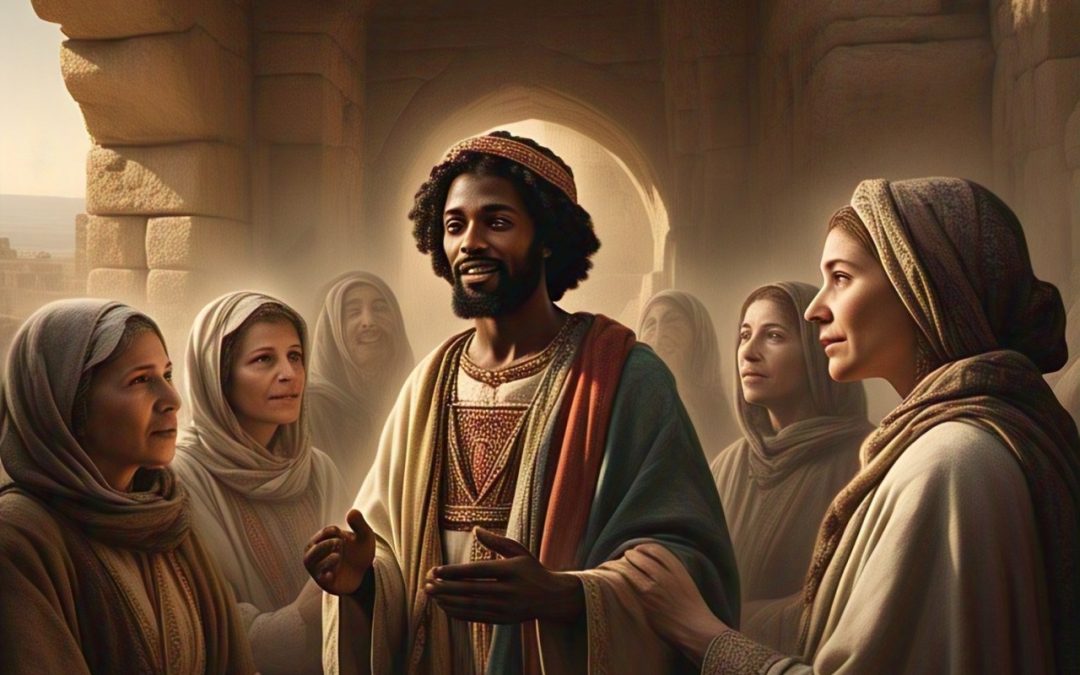
by Eron Henry | Apr 20, 2025 | Lent 2025
Historical evidence suggests Christianity’s foundational claim —”He is risen!”—emerged remarkably early in the church’s existence. Within mere years of Jesus’ crucifixion, the resurrection had already become the central tenet of Christian faith and the primary explanation for the movement’s explosive growth.
In Paul’s first letter to the Corinthians, written around 20 years after Jesus’ death, he references a creedal formula that he himself had “received” and then “passed on” to the Corinthian believers (1 Corinthians 15:3-5). Scholars widely recognize this passage as pre-Pauline, reflecting a formulation that circulated among the earliest Christians. Its structured language and non-Pauline vocabulary suggest it originated within the first few years following Jesus’ death.
This early testimony is striking not only for its chronological proximity to the events it describes but also for its content. The resurrection is presented not as a later theological development or metaphorical construct, but as a concrete historical claim with named witnesses. These witnesses included both individuals (Peter, James) and groups (“the Twelve,” “more than five hundred”), many of whom were still alive when Paul wrote.
Women’s testimony also features prominently in the Gospel accounts, a detail unlikely to be invented in a patriarchal society where female testimony carried less weight. This “criterion of embarrassment” suggests these narratives preserved authentic early traditions rather than later idealizations.
The resurrection announcement transformed a group of demoralized followers into bold proclaimers willing to face persecution and death. What explains this radical shift if not their genuine conviction that they had encountered the risen Christ? Alternative explanations—mass hallucination, deliberate fabrication, metaphorical interpretation—struggle to account for the historical data surrounding Christianity’s explosive emergence.
What makes this early testimony particularly significant is that it emerged in a Jewish context where resurrection was understood as bodily and within history, not merely spiritual or metaphorical. The first Christians were not proclaiming a comforting philosophy but testifying to what they believed was an unprecedented divine intervention that changed everything.
Prayer
Faithful God of History,
We thank You that the resurrection proclamation is no late invention but the very heartbeat of faith from its beginning. When Your Son rose from the tomb, the testimony spread quickly among those who had walked with him, spoken with him, and touched his wounds.
We are humbled to stand in this ancient stream of witness, echoing words first spoken by women at an empty tomb and by apostles in Jerusalem’s streets. Their courage to proclaim what they had seen, despite persecution and doubt, has brought the good news of resurrection to us across centuries and continents.
Forgive us when we treat Easter as merely symbolic or reduce it to springtime sentiments. The earliest believers staked their lives on this reality that You had defeated death in Jesus Christ and inaugurated a new creation.
Grant us the same conviction that transformed frightened disciples into bold witnesses. May we, like those first believers, find our courage, purpose, and hope in the risen Christ. Help us to proclaim with our lips and demonstrate with our lives that the One who was crucified now lives and reigns forever.
In all our doubts and questions, remind us that our faith is anchored not in clever myths or comforting philosophies, but in testimony preserved from those who saw, touched, and encountered the risen Lord.
Through Jesus Christ, whose resurrection has been faithfully proclaimed from generation to generation, we pray.
Amen.
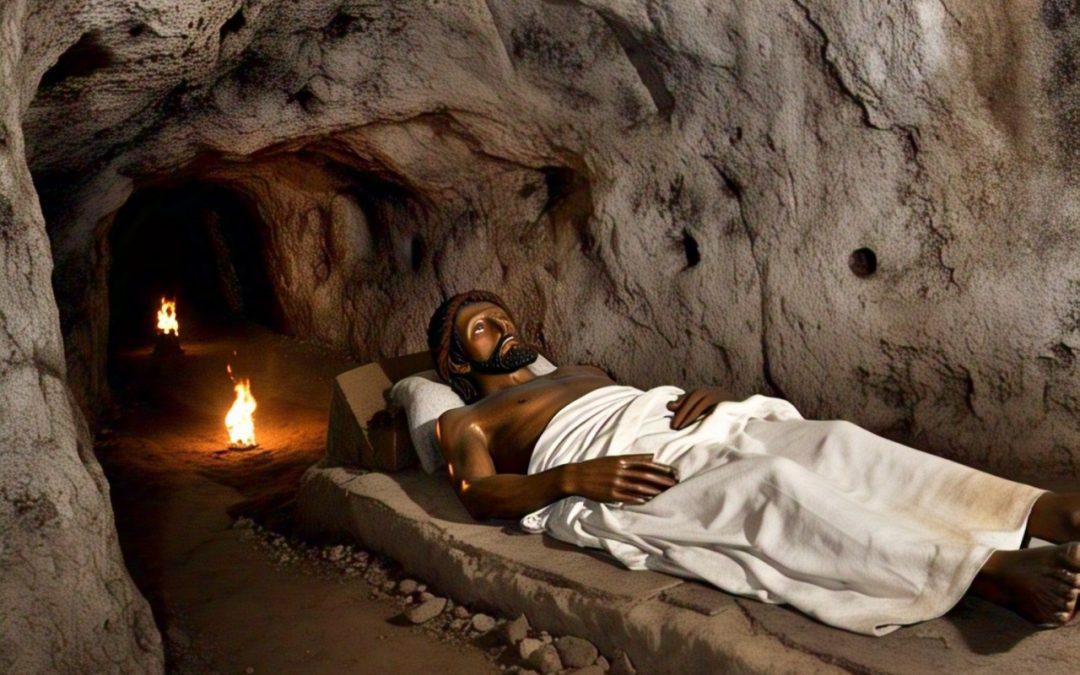
by Eron Henry | Apr 19, 2025 | Lent 2025
Holy Saturday occupies a unique place in the drama of our redemption—a pause between the anguish of Good Friday and the triumph of Resurrection morning. It is the day of divine silence, of apparent absence, of waiting in the shadow of death. Yet within this silence and stillness, mysteries unfold.
On this day, the body of Jesus lay in Joseph of Arimathea’s tomb, sealed with a stone and guarded by Roman soldiers. The One who had healed the sick, calmed storms, and raised the dead now appeared powerless, confined to the cold embrace of death. His followers scattered in fear, hiding behind locked doors, their hopes seemingly entombed with their Teacher.
Holy Saturday embodies the experience of spiritual liminality—of being caught between death and resurrection, between despair and hope, between what was and what will be. It represents those seasons in our own spiritual journey when God seems silent, when promises appear unfulfilled, when we wait in darkness uncertain if dawn will ever break.
Christian tradition speaks of this day as the time of Christ’s “harrowing of hell.” His descent into the realm of the dead to liberate the righteous souls who awaited salvation. While the Gospels themselves are silent about Jesus’ activity during these hours, this theological understanding reminds us that Christ’s redemptive work continued even in apparent absence. Death itself was being undone from within.
For the disciples, this Sabbath must have been unlike any other. The prescribed rest became an enforced stillness filled with grief, fear, and disorientation. Their minds likely replayed Jesus’ words about rising after three days, yet such promises would have seemed impossible against the finality of crucifixion and burial. Faith and doubt waged war in hearts too wounded to hope yet too committed to completely despair.
Holy Saturday teaches us the spiritual discipline of waiting, of remaining faithful when outcomes are uncertain, of trusting divine promises when evidence suggests defeat. It invites us to discover God’s continuing work even in apparent absence, to recognize that redemption often unfolds in invisible ways before becoming manifest in resurrection.
Prayer
God of the tomb and the silence, on this Holy Saturday, we pause in the shadow of death, in the space between crucifixion and resurrection, in the tension between despair and hope.
We remember how Your Son’s body lay in darkness, How his disciples hid in fear and confusion, how the women prepared spices for a burial they believed final, how death seemed to have spoken the last word.
Lord, we confess that we too know Holy Saturday experiences, seasons when You seem absent, times when promises appear broken, days when faith feels futile against unyielding reality.
In these tomb-like moments, grant us patient endurance. Remind us that even in divine silence, You are working still, that redemption continues in hidden ways, that love is never truly defeated.
As we wait between cross and empty tomb, help us to rest in the assurance of Your unfailing purposes. May we, like Jesus in death, surrender completely to Your keeping, trusting that resurrection awaits beyond our darkest hours.
Prepare our hearts for Easter joy, not by denying Saturday’s grief, but by finding You present even here, in the sacred space between death and life.
Through Christ our Lord, who sanctified even the grave.
Amen.
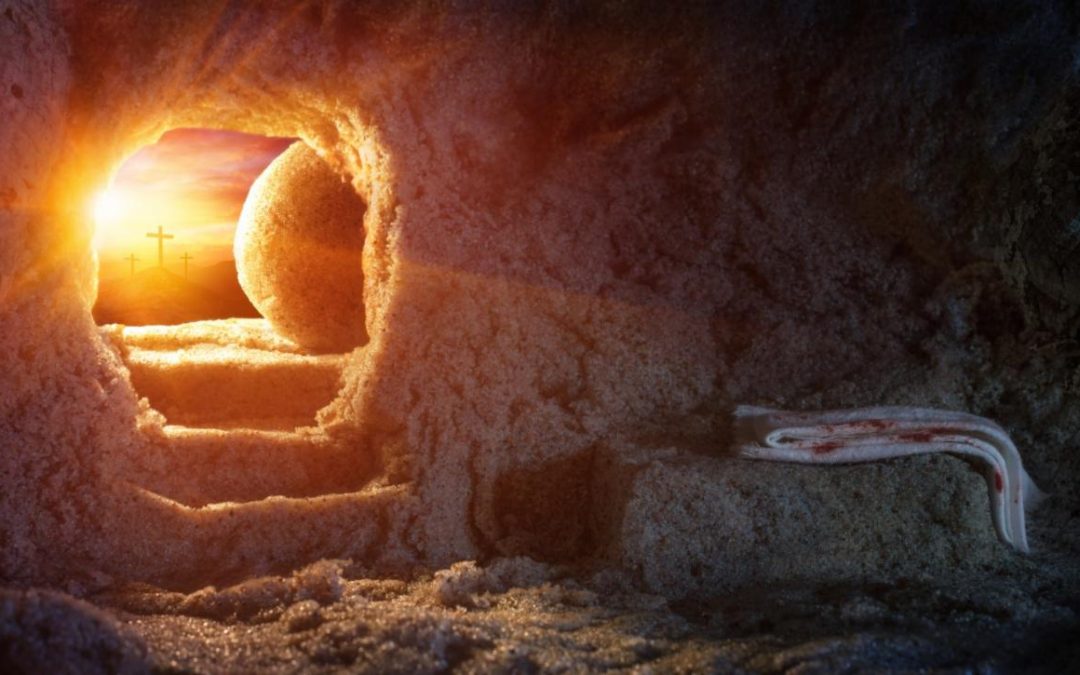
by Eron Henry | Apr 18, 2025 | Blog, News
Beloved Lott Carey Family,
Grace and peace to you in the matchless name of our Risen Lord and Savior, Jesus Christ.
This Easter, as we gather across continents and cultures to celebrate the resurrection of Jesus, we are reminded that the tomb is empty, and hope is alive. The Resurrection is not merely an event in history, it is a divine declaration that death does not have the final word, that despair will not define our destiny, and that God’s love will always outlast the brokenness of this world.
In a time marked by global uncertainty, we hold fast to this Gospel hope. As America grapples with “America First” policies that have led to the mass deportation of countless persons, many of whom are our brothers and sisters in Christ, we grieve the suffering and displacement. We witness the deepening crisis in Haiti, the unrelenting war in Ukraine, and the growing consequences of climate change across the Global South. These are not abstract headlines to us; they are real burdens carried by members of the global church.
And yet, even in the shadow of the cross, we proclaim the light of the Resurrection. We are people of HOPE!
Through it all, the mission of Lott Carey endures, sustained by the unshakable provision of God. Where there is need, we see God’s hand making a way. Where there is fear, we see faith rising. Our partners around the world, missionaries, pastors, educators, healers, are living witnesses to the power of the Resurrection. Together, we embody the Gospel that declares: He is risen indeed!
Let us be reminded this Easter that Resurrection is not only a promise of eternal life but a call to courageous living now. It calls us to advocate for justice, extend compassion, and stand in solidarity with the marginalized. It calls us to pray, to serve, to give, and to never lose heart.
The same power that raised Jesus from the dead is at work within us. So we move forward with holy expectation, believing that even in the darkest night, the morning will come. We trust that God, who began a good work in us, will be faithful to complete it.
May your hearts be lifted this Easter with renewed purpose, fresh joy, and unwavering hope.
Christ is risen! He is risen indeed!
In the hope of the Resurrection,
Emmett L. Dunn
Executive Secretary-Treasurer/CEO
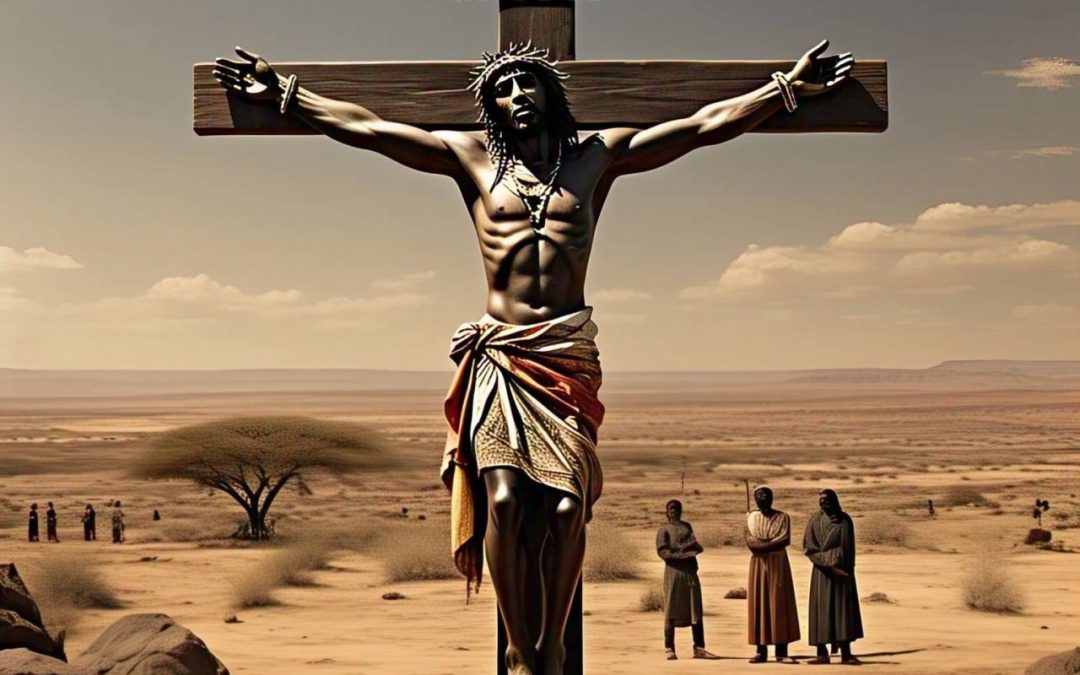
by Eron Henry | Apr 18, 2025 | Lent 2025
The cross represents the antithesis of worldly power. Roman crucifixion was designed not merely to kill but to humiliate, to demonstrate imperial might by reducing victims to objects of public shame. Yet it is precisely this instrument of domination that becomes, in the Christian narrative, the supreme revelation of divine power. As Paul writes to the Corinthians, “The message of the cross is foolishness to those who are perishing, but to us who are being saved it is the power of God” (1 Corinthians 1:18).
What kind of power manifests in crucifixion? Not coercive power that controls through force, but transformative power that operates through self-giving love. On the cross, God in Christ absorbs violence rather than perpetuating it, suffers injustice rather than inflicting it, and experiences abandonment rather than abandoning humanity. This represents power reframed as capacity for relationship rather than capacity for control.
The scandal of the cross lies in its revelation of divine vulnerability. The philosophical assumption that God must be impassible—incapable of suffering—collides with the crucified Christ. In Jesus’s cry, “My God, my God, why have You forsaken me?” (Mark 15:34), we encounter not divine detachment but radical solidarity with human experience.
Lutheran theologian Jürgen Moltmann articulates this as “the crucified God,” suggesting that the cross reveals something essential about God’s nature, not merely a temporary disguise. If, as Christians confess, Jesus fully reveals God’s character, then divine power must fundamentally include the capacity for vulnerability, suffering, and self-limitation.
This understanding of power displayed through vulnerability reshapes Christian ethics and praxis. It suggests that the church witnesses most authentically to divine power not through domination, wealth, or influence, but through solidarity with the suffering, service to the marginalized, and willingness to bear the cost of love.
For believers, the cross challenges the idolatry of self-protection. If God’s ultimate power manifests in self-giving, disciples cannot claim to follow this God while organizing their lives around self-preservation. The way of the cross invites participation in divine vulnerability—not as masochism, but as the pathway to authentic relationship and transformative presence in a broken world.
Prayer
God of astonishing power, who chose vulnerability over force, relationship over domination, and love over self-protection:
We stand before Your cross in wonder. Where we expected demonstrations of might, You gave demonstrations of mercy. Where we anticipated conquest, You offered compassion.
Forgive us for seeking power that elevates us above others, when Your power lifts others toward wholeness. Forgive our pursuit of security that insulates us from the world’s pain, when You entered that pain to transform it.
By Your Spirit, crucify in us the desire to control rather than connect, to dominate rather than serve, to preserve ourselves rather than pour ourselves out.
May we discover in the shadow of Your cross that true strength flows from surrender, that authentic power manifests in love, that Your seemingly foolish weakness Transforms more deeply than all our might.
As we follow Your cruciform way, make us vessels of Your paradoxical power, not to be served, but to serve; not to grasp, but to give; not to avoid suffering, but to transform it through the mystery of resurrection love.
Amen.
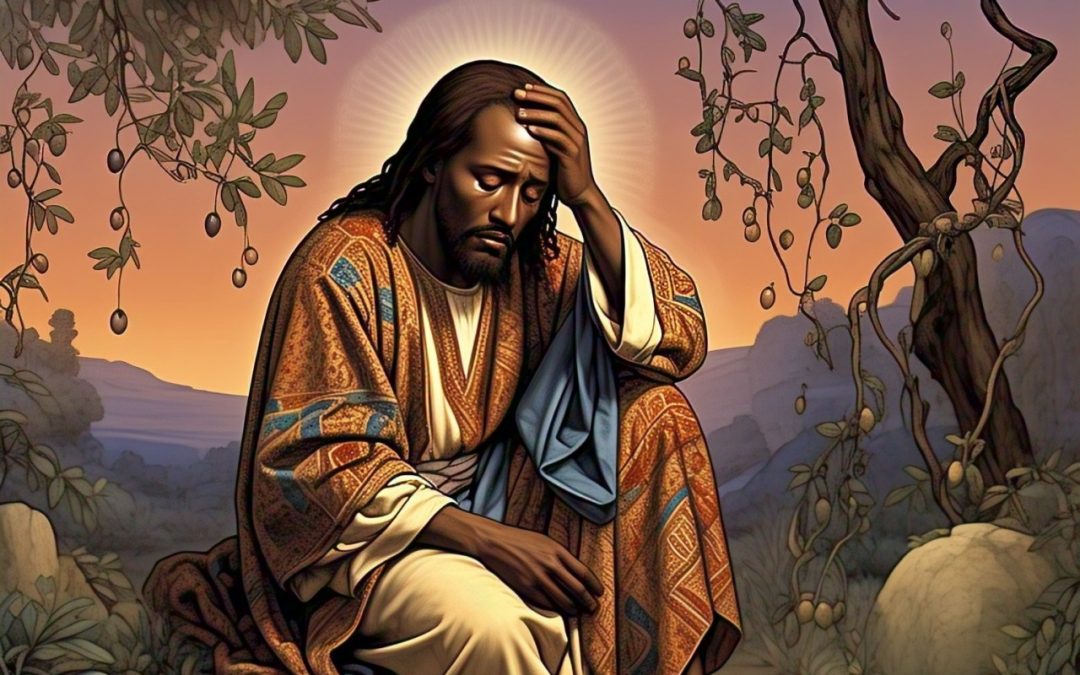
by Eron Henry | Apr 17, 2025 | Lent 2025
Maundy Thursday is a night where love and betrayal, communion and abandonment, authority and servanthood converge. The word “Maundy” derives from the Latin mandatum, meaning “commandment,” referring to Jesus’ words: “A new commandment I give to you, that you love one another: just as I have loved you, you also are to love one another” (John 13:34).
This night begins with an extraordinary act of humility. The Creator of the universe removes His outer garments, wraps a towel around His waist, and kneels before His disciples to wash their feet; a task reserved for the lowest servants. Peter’s initial resistance reflects our own reluctance to accept the radical nature of God’s self-emptying love. Yet Jesus insists: “If I do not wash you, you have no share with me.” In this reversal of human hierarchy, we witness divine love expressing itself not through domination but through service.
At the table, Jesus transforms the Passover meal into something altogether new. Taking bread and wine—ordinary elements of sustenance—He imbues them with extraordinary significance: “This is my body… This is my blood.” With these words, He establishes a memorial that will transcend time and culture, inviting believers across millennia to participate in His sacrifice. The meal that commemorated Israel’s deliverance from Egyptian bondage now points toward humanity’s deliverance from sin and death.
As the night deepens, Jesus leads His disciples to Gethsemane. Here, in the quiet darkness of an olive grove, we witness the full humanity of Christ. “My soul is very sorrowful, even to death,” He confesses to His closest friends. Three times He prays for the cup of suffering to pass from Him; three times He concludes with perfect submission: “Nevertheless, not my will, but yours, be done.” The struggle is real, yet His surrender is complete.
The night culminates in betrayal. With a kiss—a sign of affection twisted into treachery—Judas identifies Jesus to the arresting party. The disciples, despite their earlier protestations of loyalty, scatter into the darkness. The One who had just washed their feet and broken bread with them now stands alone, abandoned by all but the Father.
Maundy Thursday invites us to contemplate the cost of love that gives itself completely, the beauty of a God who serves rather than demands service, and the mystery of communion that transcends betrayal. It challenges us to examine whether we, like Peter, resist Christ’s humble love, or like Judas, betray it for temporary gain, or like the other disciples, abandon our commitments when they become costly.
Prayer
Lord,
On this holy night, we remember how You knelt before Your disciples, washing their travel-worn feet with Your holy hands. Forgive our pride that resists Your humble service and our reluctance to follow Your example of loving servanthood.
We recall how You took bread and wine, transforming them into vessels of grace and remembrance. Thank You for inviting us to Your table, where we encounter Your presence and receive Your life. May we never approach this sacred mystery with casual indifference.
We contemplate Your agonizing prayer in Gethsemane, where Your human will surrendered completely to the divine purpose. In our own moments of suffering and resistance, teach us to pray as You prayed: “Not my will, but Yours be done.”
We acknowledge the betrayals that pierced Your heart on this night—Judas with his kiss, Peter with his denials, the others with their flight. Forgive us for the times we too have betrayed Your love through our actions, words, or silence.
Grant us grace to fulfill Your mandatum novum—Your new commandment—to love one another as You have loved us. May our love be neither sentimental nor selective, but sacrificial and inclusive, reflecting the love You demonstrated at the basin and on the cross.
As the shadows of this day deepen toward Good Friday, keep us watchful and faithful, ready to follow You even to Calvary.
In Your name we pray.
Amen.











Recent Comments